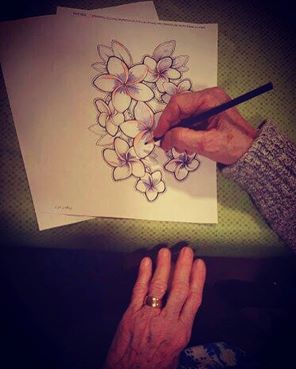
I love this picture of Mimi. I love that she’s content and coloring. I love that she started with some peach and is now adding purple. I love how her left hand is perched like she’s thinking about steadying the paper, but is concerned about leaving a smudge. But Mimi is at the ready if that paper even thinks about shifting. Coloring outside the lines doesn’t seem to be an option for this lady. I love that the flowers she’s coloring look exactly like the flowers she used to draw on construction paper for me to color when I was a kid, and I hate that she probably doesn’t remember that.
I love that she’s wearing her wedding ring.
I can’t see her face in this shot, but I know it so well I don’t have to. She’s calm and focused. She’s in the present moment. Living with dementia is frustrating and scary, and the present moment is all they have. When I lived with my grandmother and took care of her she was often terrified to the point of tears because she couldn’t remember if she’d eaten, or what day it was, or if her sisters and husband were dead or alive.
She could sit for hours in the kitchen while I cooked, and then we’d eat our evening meal, which was often in the afternoon because we had a hard time filling the days. When that meal was over I’d be packing up the leftovers and she’d say, “I don’t know what you’re doing, babydoll, but if you’re fixing something to eat don’t make me a plate. I’m not hungry.”
I’d crumble against the kitchen counter—sometimes in laughter if it was one of those days, and sometimes out of exhaustion because we had days like that, and with each passing day it became more obvious how sick my grandmother was becoming and how there was neither a cure nor a reversal for her disease. It was an agonizing time for my mother and me. We had no idea how we were going to get through it or what the outcome was going to be.
We tried to figure out how to keep my grandmother at home, but in order to do that we’d have to unravel decades of extreme hoarding. Mimi’s apartment was so degraded that in order to bring in someone to help, we’d have to get the apartment squared away and it was impossible to do that with Mimi in it. She wouldn’t let us remove so much as a single broken flashlight.
We came up with a million possible scenarios, but none were actually feasible. We thought about taking her on a vacation for a month so we could get the place together, or having her stay with a relative so my mother and I could do the cleaning out. We came up with these ideas out of desperation, and had no idea how many months it would take to get the apartment cleared out and cleaned up. (When we were in the thick of it I wrote a blog post that you can read HERE about what it was like when I was first taking care of my grandmother and thought we could clean up around her.)
When a family is in crisis they often grasp for hope where hope does not exist. Often—as was the case in my family—there are other factors driving the decision-making process. It was emotional, and the emotional components muddied our thinking. There was guilt, anger, resentment, and regret. There was shame. We cycled through the five stages of grief more times than I care to count. We dipped our toes into acceptance (sometimes defined simply as having more good days than bad days), but on the bad days we found ourselves spiraling back to anger and depression.
The one stage we had to avoid at all costs was denial. Denial would not get us through this. I continually reminded myself that the only way out was through. I wanted to simultaneously curl up in a ball and pull the ripcord on my parachute, but that was denial and I had to get the hell out of there.
Denial plagued my family, both the one I know and undoubtedly for the generations that preceded me. Denial kept them safe—in a way, for a time—from feeling their emotions. As a coping mechanism denial keeps emotions in check, but it doesn’t facilitate change. Bargaining is also a dangerous neighborhood; it keeps us in the past and wishes it had been different. Bargaining’s language is plagued with statements starting with “what if” and “if only.”
Nothing changes when a person stays in either the denial or bargaining stages; that work begins when we become angry. Anger is uncomfortable and once we go there it can feel bottomless. It’s so tempting to slide back to denial—and a normal part of the process—but anger is where the magic happens.
Anger is where we find strength. Strength is where we facilitate change. Love helps us to do this.
When I first started caring for my Mimi I wrote this:
My cleaning is not going to mend my grandmother’s brain or heart, but yet I continue. I dig through the rubble and scrub surfaces in part because it needs to get done, but also because an organized exterior might calm some of the agitation that percolates inside her. I have faith and hope in that possibility, but I do this work for a different reason: I do it for love.
On some level I’m doing this work more for me than for anything or anyone else. I do it because loving someone when it’s difficult is one of life’s greatest challenges and rewards.
I believed we could love our way through it, and we did. Love was the antidote to our anger and denial, and love is where we found our strength.
It’s been almost two years since Mimi moved into assisted living, but two Februaries ago we were still very much in the thick of it, still unsure of the way out and hoping there was actually a way through. We subsisted on hope, but we were panicked and afraid. Our doubts often outnumbered our faith. We felt despair most of the time, but we kept going. We had no choice but to push back against inertia until we found a strength that was more powerful than fear.
The angst didn’t subside once we moved Mimi into her memory-care facility, but there was a peace knowing she was safe and we could move onto the next project of cleaning out and remodeling her apartment. It took a long time—most of the past two years—but I think my mother and I have finally gotten to the acceptance stage. It was a hard choice to make, but making a choice was where we found our power, and Mimi is not only happy but also thriving in her new environment.
I follow a few Alzheimer’s groups on Instagram, and this post came across my feed last week.

The instagram followed in the footsteps of the picture of Mimi coloring that my mother sent to me. Mimi was never a crafty kind of grandmother, so it surprised us that the aides who work at her assisted living have gotten her into coloring. The truth is, if my mother or I suggested coloring to Mimi she’d probably smirk and say something witty and dismissive, but she has a few “boyfriends” at assisted living who can get her to do almost anything.
These boyfriends aren’t other residents, but young men almost half my age who work there, though they seem closer to angels than anything else. Mimi still has bad days, but when one of her boyfriends is on shift she always has a good day. Her birthday was last month, and one of her boyfriends was not only working a double that day, but his birthday was a few days later, so Mimi asked my mother to get a cake—one cake—that said, “Happy Birthday Cathy and Sal.”
When my mother went to get the cake they didn’t have one big enough to fit all the writing on it and that would feed everyone, so she had to get two cakes. I figured Mimi would be upset not to have both of their names on one cake, but she didn’t care as long as she had a grip on Sal.

If my mother visits when one of Mimi’s three boyfriends is on staff she gets irritated and sometimes outright ignores her until a few hours pass and when my mother suggests she might head home Mimi is quick to dismiss her. She’d rather have visitors on the guys’ off days, because when one of them is working she just wants to follow them around and do whatever they are doing or whatever activity they suggest for her. Jonathan was Mimi’s first assisted living boyfriend and can even get her to go for a haircut, which she hates, but at his first suggestion she leaps to go.
My grandmother is totally boy crazy.
I spoke to Mimi on Valentine’s Day, and she told me she’s “Fit as a fiddle and ready for love.” I was driving and almost choked. She went on to tell me that she just hasn’t “found the right guy,” and I said, “I heard you have three boyfriends!” She consulted Maureen, who was also driving, who confirmed that Mimi does in fact have three boyfriends. Mimi seemed a little shocked, but hardly missed a beat before she told me, “I’m just trying to figure out who is the right one, but until then I’m keeping all of them.”
Mimi might not remember from one moment to the next, but she hasn’t lost her sense of humor. She also hasn’t lost her belief in love. I think Mimi was nineteen when she met my grandfather and he gave her a promise ring (that I have) before he left for the war. She married him when he got back and the rest is history. He died four-and-a-half years ago, but I’m quite sure it’s never occurred to her to take off her wedding ring.
I love that ring. I’m torn between knowing she should be buried with it and wanting to have it as a reminder of how my grandmother has forgotten a lot of things, but she’s never forgotten to believe in love.

Love the way you write!